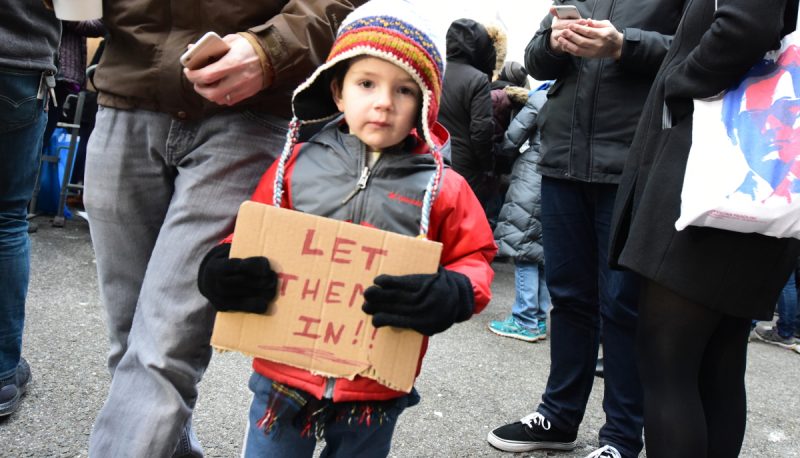Update: Recent media reports suggest that the Trump administration will be issuing modified travel restrictions before the cases challenging its Muslim ban are argued at the U.S. Supreme Court next month. The Court is likely to ask attorneys to submit new briefs arguing how this affects their case. People For the American Way Foundation and other parties to a recent friend-of-the-court brief on the ban’s religious freedom violations will be closely monitoring the situation.
On October 10, the U.S. Supreme Court is scheduled to hear oral arguments in two cases challenging President Trump’s executive order banning immigration from six Muslim-majority countries. Enacted after Trump’s earlier order was roundly rejected by members of Congress, the courts, and the American people, the current ban is a “fix” in name only. It is still an unconstitutional affront to core American values. As People For the American Way Foundation’s Elliot Mincberg put it:
There’s simply no credible argument that the Trump administration’s order is anything other than a Muslim ban in a not very good disguise. This kind of government action directly contradicts the core values laid out in the First Amendment. It’s critical that Americans of all backgrounds make clear that we won’t accept this kind of unconstitutional attack on our friends and neighbors.
Mincberg’s comments came as PFAW Foundation joined the Southern Poverty Law Center, Americans United for Separation of Church and State, and allied religious and civil rights organizations and members of the clergy on a friend-of-the-court brief filed with the Court on September 18. Our introduction:
Our constitutional order admits of no official denigration of religious minorities or official disfavor toward anyone based on faith or belief. “If there is any fixed star in our constitutional constellation, it is that no official, high or petty, can prescribe what shall be orthodox in politics, nationalism, religion, or other matters of opinion * * *.” W. Va. State Bd. of Educ. v. Barnette, 319 U.S. 624, 642 (1943). Hence, the Religion Clauses of the First Amendment and the Fifth and Fourteenth Amendments’ guarantees of equal protection “all speak with one voice on this point: Absent the most unusual circumstances, one’s religion ought not affect one’s legal rights or duties or benefits.” Bd. of Educ. v. Grumet, 512 U.S. 687, 715 (1994) (O’Connor, J., concurring in part and concurring in the judgment). “[T]he Establishment Clause forbids the government to use religion as a line-drawing criterion. In this respect, the Establishment Clause mirrors the Equal Protection Clause.” Id. at 728 (Kennedy, J., concurring in the judgment).
This “essential commitment to religious freedom” (Church of the Lukumi Babalu Aye, Inc. v. City of Hialeah, 508 U.S. 520, 524 (1993)) was no accident. “The history of governmentally established religion, both in England and in this country, showed that whenever government had allied itself with one particular form of religion, the inevitable result had been that it had incurred the hatred, disrespect and even contempt of those who held contrary beliefs.” Engel v. Vitale, 370 U.S. 421, 431 (1962). Accordingly, the Framers drafted the First Amendment with “awareness of the historical fact that governmentally established religions and religious persecutions go hand in hand.” Id. at 432.
The challenged Executive Order reneges on our Nation’s commitment to religious freedom by targeting Muslims for opprobrium, denigration, and discrimination based solely on their faith. This marking of one religion for official disfavor—this ban on Muslims—cannot be justified by the government’s asserted interest in combating terrorism, because the Muslim ban is woefully ill-suited to achieving that interest.
The Muslim ban has also unleashed and placed the government’s imprimatur on persecution and violence that endanger lives and rip communities apart. Consequently, attacks on mosques and other anti-Muslim hate crimes have nearly doubled since the Muslim ban was instituted. The Establishment Clause protects against this official incitement of prejudice and cruelty.
The government’s casting of one group as the object of fear, disrespect, and maltreatment is invidious discrimination and an unconstitutional religious preference that cannot withstand scrutiny. This Court should affirm the preliminary injunctions to preserve the “profound commitment to religious liberty” “that has served [this Nation] so well.” (McCreary County v. ACLU of Ky., 545 U.S. 844, 882, 884 (2005) (O’Connor, J., concurring)).
